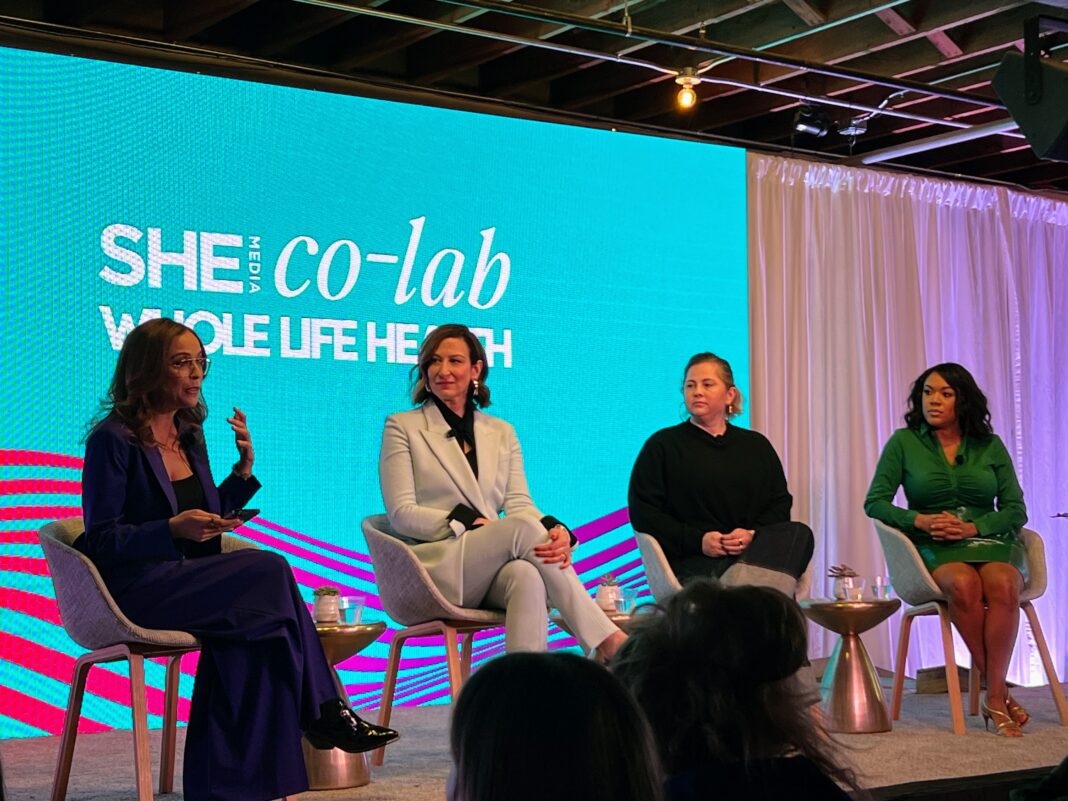
Whether you’re a member of the media, an entrepreneur, a podcast host, or philanthropist, that feeling of “loneliness” and isolation isn’t a stranger to you – nor is it to the person you interact with every second of every day.
Loneliness can affect anyone of any age, and increasingly, it is as it continues to quietly become a public health crisis. Yet, its impacts are not felt equally across society – especially for many women and minorities whose isolation is compounded by lack of representation and true allyship within their respective industries and communities.
Navigating the Mental Health Epidemic of “Loneliness”
This year’s SXSW 2024 saw the return of lifestyle media company SHE Media as it hosted its Second Annual Co-Lab in Austin, Texas, elevating leading voices and persons of influence in women’s health to the stage.
Spanning three days of official SXSW programming and 29 carefully curated panel discussions centered around the science and stories of women’s whole life health including the latest innovations and how technology is revolutionizing healthcare. This included insightful panels and fireside chats speaking to ADHD, media & advocacy for women’s rights, black maternal health, neuroscience, and more.
From Brooke Shields, Katie Couric, and Sophia Bush to Shira Lazar (What’s Trending), Tiffany Cross (host of iHeart Media’s ‘ACross Generations’), Mandy Teefey (co-founder Wondermind) and Ann Shoket (founder of The Li.st and New Power Media), this year’s activation wasn’t shy about bringing these uncomfortable, but crucial conversations front-and-center as it tastefully built upon last year’s inaugural Co-Lab.
While True Hollywood Talk attended all three days of programming, one panel discussion in particular really stood out – Navigating the Mental Health Epidemic of Loneliness, moderated by What’s Trending founder and CEO Shira Lazar.
Lazar, an Emmy-nominated pioneer in digital culture and emerging trends, is also the founder of What’s Trending and Peace Inside Live with her newly published book, JOMO Journal, which collectively, brings tranquility and balance to the fast-paced corporate world by highlighting the significance of mental well-being in today’s digital age.
Shoket, the former editor-in-chief of Seventeen Magazine, spends the majority of her time serving as the founder and CEO of The Li.st, a nationwide community of high-impact women and under-represented leaders where she uses her platform to help women step into their power and to redefine ambition and success for a new generation.
Cross, the host of MSNBC’s “The Cross Connection,” debuted her new podcast series “ACross Generations,” on March 12. The series – hosted by iHeartPodcasts and Will Packer Media, a first-of-its-kind production and branded content company led by record-breaking Hollywood producer Will Packer – brings together Black women from different generations to have emotional, funny and heartwarming exchanges about life experiences at different decades of their journey.
Teefey is the co-founder and CEO of Wondermind, a company driven to tackle the stigma around mental health and create accessible mental healthcare resources. In a recent interview with Forbes, she revealed that the inspiration behind Wondermind stemmed from years of struggling with health and mental issues, including a wrongful diagnosis of bipolar II, where in her early twenties, she was properly diagnosed with ADHD and trauma.
After years of being improperly treated and medicated, she wanted to push the mental health conversation forward, rather than simply adding to the noise. The startup completed a successful funding round in November 2021, backed by Serena Williams’ venture capital firm Serena Ventures, eventually launching in 2022 as “the world’s first mental fitness ecosystem” on a mission to destigmatize and democratize mental health by coming together to explore and create safe, inclusive spaces for people to navigate their feelings.
Sounding the Alarm
Kicking off the panel, Lazar set the stage by citing alarming statistics on loneliness reaching epidemic levels globally, where “loneliness” itself is now considered to be a public health crisis on par with obesity. But as the speakers would reveal, the issue disproportionately affects those facing additional barriers of gender and racial inequality.
So, how do these incredible women continue to drive awareness to this epidemic? Shoket shared research demonstrating the staggering prevalence of loneliness among professional women and how it hinders their career advancement.
According to her company’s research, she shared with attendees that 80% of women feel lonely at work, hindering career advancement, while Lazar added that 1 in every 4 people feels some form of loneliness.
“As the only woman in meetings, I often felt isolated,” said Shoket, adding that “80 percent of women feel lonely at work.” She referenced the US Surgeon General, Dr. Vivek Murthy, who considers loneliness an epidemic on par with obesity. Dr. Murthy’s research also indicated that loneliness negatively impacts physical and mental health.
This sentiment was also echoed by Cross, who revealed that she, too, faced loneliness as a Black female founder seeking Silicon Valley funding.
“As a founder, it can be very lonely because you’re in the trenches by yourself,” Cross said. “When I went to Silicon Valley in the Alley, I did not see myself reflected in any of these conversations. I was sitting across from 25 to 30 year-old white men who I had to convince that I had a problem and a solution.”
Cross told attendees and her fellow panelists that she was often met with “having to defend and define [her] humanity… it wasn’t that I didn’t have the option to choose not to work because I felt lonely… there was no other pathway.” This, according to Cross, only grows heavier when compounded with social media where it becomes the “highlight reel” of everyone else’s hype. “We’ve gotten to a point now where everyone wants to build their own empire to themselves, everybody wants to be a celebrity, and everybody has assumed whatever title they want and put these things out there.”
Teefey, on the other hand, focused on self-reflection and reconnecting with oneself as a way to combat loneliness. She operates with the belief that spending time alone can help people learn who they are, rather than conforming to outside expectations or agendas.
At the end of the day, Cross says that it’s all about putting that phone down. “I think that if we can sit there…in that loneliness…and relearn what makes us feel good, cool, and what will fulfill our being, that could make us feel a little bit less lonely,” she explained. “I hear you on social media, I have a hard time with it too, but I have an alarm on my phone where after 30 minutes on Instagram, I have to put it down, otherwise I will find myself scrolling for an hour and looking at utter nonsense,” she continued.
Integrating This Into Work
We all know that feeling of “FOMO,” or the fear of missing out, but is this something that we as a society should be perpetuating?
According to Lazar, absolutely not. Over the past year, Lazar has continued to push her latest initiative, Peace Inside Live, and the idea of ‘JOMO’, or the joy of missing out, as an alternative mindset we should also begin to adopt for our own mental health.
Shoket also introduced her latest initiative, “10 Minutes to Togetherness,” a mechanism powered by “micro-habits” to help encourage people to create small acts of connection such as checking in with colleagues daily and building personal relationships through those small acts.
“I love that because you don’t have to go to cocktail parties. You don’t have to go to networking events. You don’t have to go on corporate retreats. You don’t have to learn to play golf. You literally have to text someone and check in – ‘how are you?’ ‘How’s it going?’ ‘You’ve been on my mind,’ ‘how can I help you’ – go and walk around your office, just walking around the office is so important. Having a human conversation with someone and asking about their presentation? like Hey, how did it go on the presentation? Can I help you? Making a phone call from the car, a really simple way that you can take this lonely time of being in the car and turn it into a moment of connection. We help folks tap into their inner cultivator.”
So, why the “10 minutes?” Shoket pointed back to Dr. Murthy’s research and how it talked about this 20-year decline in time spent together. If we spend 10 minutes a day intentionally building our networks, we decrease that by 50 percent.
How Are You Showing Up For Yourself?
If there’s one thing to take away from this article my dear reader, it’s never lose yourself. Lazar’s final question centered around how we as “multi-dimensional people” can show up for ourselves and others to prevent this feeling of loneliness from happening – individually, professionally, as a boss, etc.
“This is the hardest thing to do,” Cross acknowledged. “The hardest thing is to know that it’s going to be okay, even if it’s not okay. Your best day is to show up at your worst day.”
– Tiffany Cross, journalist and host of ‘ACross Generations’
Teefey says that she personally schedules breaks twice a day for her own self-care – whether it’s “mindless scrolling, meditation, or just being present.” As a boss, she says she “leads with vulnerability” and “encourages her team to do the same.”
“I’m very vulnerable and I will let them know if there’s something I don’t understand and help break it down for me. Or, if I communicate with them and say, ‘look guys, I’m having a bad day…I want them to be able to come to me and tell me the same thing so we can communicate and keep that team building and trust, because trust is the most important component.”
– Mandy Teefey, co-founder and CEO Wondermind
She shared her experience in showcasing that vulnerability:
“The more vulnerable I am, the more vulnerable other people are. I encourage everyone to be bold and be courageous enough to know that whatever you’re feeling, somebody else has felt that very thing and stand comfortably and confident in it even if you’re a little embarrassed. Speak up…even if you’re a little embarrassed, just remember that hey, ‘I was bold enough to share it and other people weren’t and that’s okay and be okay with that.”
Adding to Cross’s perspective, Shoket also emphasized the importance of a two-way street:
“If you want someone to show up for you, you have to show up for them…[o]ne of the unspoken rules of TheL.ist is ‘two gives for every ask’…The worst thing in the entire world, the one thing that I can’t stand more than anything is when somebody says ‘oh my god, you know, so and so? Oh, you should know them’…[I]nstead of somebody who says, ‘oh my God, you know, so and so you should totally know them. I’m going to connect to you!’ That’s the next step of showing up for someone. I’m going to make a connection for you. I’m going to come to your event and show you support. I’m going to make that phone call for you.”
– Ann Shoket, founder and CEO The L.ist
Her parting wisdom to everyone in the room was to send a “check-in text” – “whose that person that you’ve been meaning to reach out to and say ‘you’ve been on my mind, how can I support you?’ That is leadership. That is self-care. That is community.”
We Have the Power
While loneliness impacts everyone, these leaders agreed the issue demands an intersectional approach that centers the most marginalized voices. Through open and honest dialogue, as well as small acts of compassion each day, they hope to help alleviate the isolation so many quietly endure. Their message serves as a call to action for building stronger, more inclusive communities where all people feel seen, heard and supported.
“I think it takes bravery [to speak out]…we have created this society and perpetuated it by participating in it, and that is something that we collectively have to stop. We have the most power, Meta is a big, powerful organization, but WE the consumers have way more power than these corporations. If we stop using it, then they won’t have as much power,” Cross emphasized to the audience.
– Tiffany Cross, journalist and host of ‘ACross Generations’








